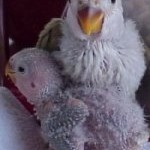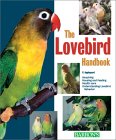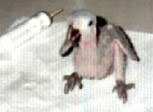Dangers and Risks of Hand-feeding Baby Birds
Many people have heard the myth: if you want a parrot to truly bond to you, then you should handfeed the bird yourself. Nothing could be further from the truth. More relationships between bird and human are damaged by improper hand-feeding and socialization during the early weeks of a parrot’s life. This damage is less obvious than that seen in cases of outright physical harm. Burned crops, malnutrition, pneumonia due to aspirated food, sour crop, and bacterial infections are just a few of the issues that arise when inexperienced people take on the responsibility of handfeeding a parrot.
 Responsible and reputable breeders will tell you unequivocally that parrots can bond to you just as well (if not better!) if you allow the experienced handfeeder to properly care for your bird and wean it at the appropriate time. It is important for the public to understand this truth to prevent more needless deaths of baby parrots. Breeders who try to convince you that it is “easy” and that the bird will bond to you better are most likely just trying to save themselves a few weeks of work. I have heard of cases where macaws were weaned weeks or even months before the particular species would normally wean. These practices can cause long-term behaviorial and health problems.
Responsible and reputable breeders will tell you unequivocally that parrots can bond to you just as well (if not better!) if you allow the experienced handfeeder to properly care for your bird and wean it at the appropriate time. It is important for the public to understand this truth to prevent more needless deaths of baby parrots. Breeders who try to convince you that it is “easy” and that the bird will bond to you better are most likely just trying to save themselves a few weeks of work. I have heard of cases where macaws were weaned weeks or even months before the particular species would normally wean. These practices can cause long-term behaviorial and health problems.
Baby LovebirdsMany difficulties can occur while handfeeding. The most common problems seen with handfeeding are sour crop (or crop stasis) and bacterial infections. Even very experienced handfeeders encounter these problems. They can often immediately rectify this by emptying the crop, something an inexperienced person simply cannot do.
The issue of sour crop (basically the food does not digest and sits in the crop rotting) comes up quite often with cockatiels, hence you should not think it is “easier” to handfeed smaller parrots.
 baby birdAnother recurring issue with handfeeding is proper weight gain. Experienced breeders will weigh babies daily to be sure they are gaining the proper amount of weight. This becomes even more critical during weaning, as babies will lose a certain amount of weight, but you don’t want them to get too thin. As babies become more resistant to the syringe, an experienced person might think they are getting enough nutrition, when in fact they are not. While it can be difficult to assess the long-term implications of chronic underfeeding other than the obvious effects of malnutrition, many aviculturists believe this can cause behavioral problems as the bird does not develop a sense of security. Some have even suggested that this can be the basis for behavior that leads to self-mutilation (feather destructive behavior) later in life.
baby birdAnother recurring issue with handfeeding is proper weight gain. Experienced breeders will weigh babies daily to be sure they are gaining the proper amount of weight. This becomes even more critical during weaning, as babies will lose a certain amount of weight, but you don’t want them to get too thin. As babies become more resistant to the syringe, an experienced person might think they are getting enough nutrition, when in fact they are not. While it can be difficult to assess the long-term implications of chronic underfeeding other than the obvious effects of malnutrition, many aviculturists believe this can cause behavioral problems as the bird does not develop a sense of security. Some have even suggested that this can be the basis for behavior that leads to self-mutilation (feather destructive behavior) later in life.
Handfeeding is not an easy task. Many new bird owners have lamented the fact that someone convinced them they could easily handfeed their baby African Grey or macaw. It is very painful to realize you slowly starved your bird to death or burned its crop so it was in constant pain until it died. Some bird lovers and breeders have started a campaign in memory of an African Grey who died in the hands of an inexperienced person. Take heed from all these warnings and don’t be seduced by the myth that the baby will love you more if you handfeed it.










